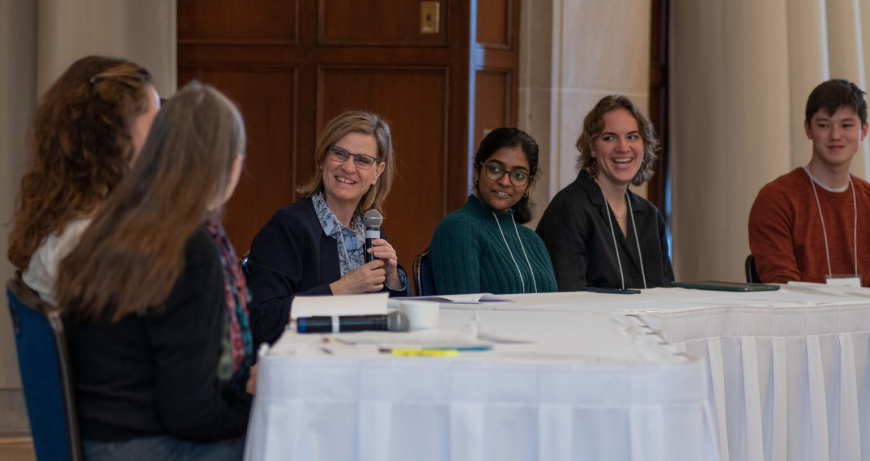
 back to all news
back to all news
U-M launches effort to support student climate education

Students, staff and faculty, representing an array of University of Michigan units and disciplines, are collaborating to advance climate education.
Their objective is to recommend ways for all U-M students on the Ann Arbor campus to gain knowledge and skills to turn climate literacy into action.
Michaela Zint, associate dean for academic affairs at the School for Environment and Sustainability, is leading this effort, in partnership with associate deans from all 19 schools and colleges, to present climate-education recommendations to the provost by May 2023.
“President (Santa J.) Ono mentioned during his recent inauguration that climate change is the existential crisis of our time, and our task is to ensure that U-M can be a leader in climate education,” Zint said.
“Our students are already, and will continue to be, impacted by climate change. They want to be empowered to make a difference through actions in their lives, communities and their future professions. Moreover, employers want a workforce able to anticipate and meet the challenges ahead.”
Climate education was the focus of a Provost’s Seminar on Teaching, organized by the Center for Research on Learning and Teaching, at the Michigan Union on March 20-21. It drew approximately 100 attendees engaged in climate education efforts across the university.
“The problem of our climate emergency will not be solved in siloes. Climate change comprises social, economic, political and scientific dimensions, and to meet this challenge, our approach must do the same,” said Valeria Bertacco, vice provost for engaged learning.
“As a leading research university, we are in a unique position to lead the coordinated interdisciplinary engagement on climate action that our civilization requires at this moment.”
Seminar participants discussed the need for a collective, universitywide approach to climate education, informed by leading research and pedagogies. Many stressed the importance of going beyond learning about the ramifications of the climate crisis to help students implement tangible, transdisciplinary solutions — on campus and in their future careers.
“Universities must serve as living-learning labs in pursuit of sustainability, charting innovative approaches in operations toward carbon neutrality while educating and involving students to foster a long-term commitment,” said Alex Bryan, director of Student Life Sustainability.
“This effort will ensure broad representation from U-M schools and colleges, students and staff toward a wicked problem that requires all of our efforts.”
During the seminar, student panelists discussed how studying climate and sustainability across different fields enables them to gain multiple perspectives. They also noted it is important to encourage students to take related courses, incentivize faculty to integrate climate action and sustainability within their courses, and allow coursework to reverberate beyond the classroom and into the community.
Going forward, working groups will examine faculty professional development, the use of campus and community as a living laboratory, the integration of climate education across campus curricula, and other potential climate-education areas that could advance student success.
Efforts build upon a previous Student Sustainability Coalition-led event that took place in October 2022 emphasizing the broad effects of the climate crisis and the importance of sustainability actions that fit within a wide range of future career pathways.
“Because climate change will affect the lives of all students, we need to ensure they have access to high-quality climate education designed to empower them to make meaningful change in their communities,” said Taylor Valentine, a graduate student at SEAS focusing on sustainability and development.
“Every student, regardless of discipline, deserves to be prepared for the future we’re all facing. Only together can we usher in the transformative change needed to build a healthier, more just and more sustainable world.”
Currently, the university offers more than 800 sustainability courses, with more than 800 faculty members focusing on environmental topics. There also are more than 8,000 certified Planet Blue Ambassadors and more than 100 student organizations that focus on sustainability.

